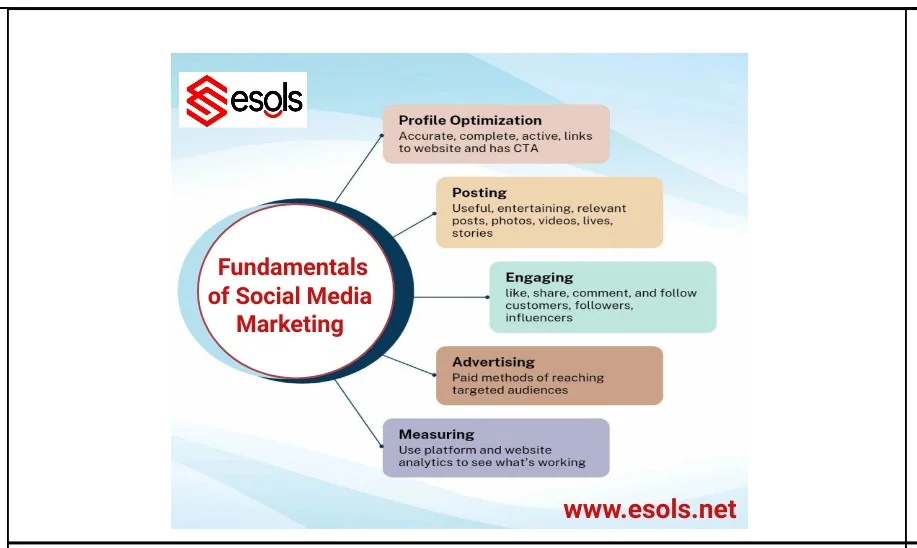Social media marketing has become an essential component of any modern business strategy. Whether you’re a small business owner or a large corporation, leveraging social media platforms can drive brand awareness, customer engagement, and sales growth. In this guide, we’ll explore the fundamentals of social media marketing, providing you with actionable insights to help you navigate this dynamic landscape.
Table of contents
- What Is Social Media Marketing?
- Why Is Social Media Marketing Important?
- How Do You Develop a Social Media Marketing Strategy?
- What Are the Best Practices for Social Media Marketing?
- What Are Common Challenges in Social Media Marketing?
- Social Media Marketing Overview
- Conclusion: Mastering Social Media Marketing
- FAQ’s
What Is Social Media Marketing?
Social media marketing involves using social media platforms to connect with your audience, build your brand, increase sales, and drive website traffic. It includes publishing content on social media profiles, engaging with followers, and running social media advertisements.

Why Is Social Media Marketing Important?
- Increased Brand Awareness: Social media platforms provide a global stage to showcase your brand.
- Higher Conversion Rates: Engaging with your audience on social media can lead to higher conversion rates.
- Cost-Effective Marketing: Compared to traditional marketing, social media offers a cost-effective way to reach a vast audience.
How Do You Develop a Social Media Marketing Strategy?
A well-thought-out strategy is crucial for successful social media marketing. Here’s a step-by-step guide to creating a social media strategy.

Step 1: Define Your Goals
Start by identifying what you want to achieve with social media marketing. Common goals include increasing brand awareness, generating leads, and driving website traffic.
Step 2: Know Your Audience
Understanding your target audience is key to creating content that resonates with them. Use social media analytics tools to gather insights into your audience’s demographics, interests, and behaviors.
Step 3: Choose the Right Platforms
Not all social media platforms will be relevant to your business. Focus on the platforms where your target audience is most active. For example:
- Facebook: Ideal for reaching a broad audience.
- Instagram: Best for visual storytelling and reaching younger demographics.
- LinkedIn: Suitable for B2B marketing and professional networking.
Step 4: Create Engaging Content
Content is the backbone of social media marketing. Your content should be relevant, engaging, and tailored to your audience’s interests.
Step 5: Schedule and Post Consistently
Consistency is crucial for maintaining your audience’s interest. Use social media management tools to schedule your posts and ensure they go live at optimal times.
What Are the Best Practices for Social Media Marketing?
Engage with Your Audience
Engagement goes beyond posting content. It involves responding to comments, messages, and mentions. Active engagement builds a community around your brand.
Monitor Analytics and Adjust Your Strategy
Regularly review your social media performance using analytics tools. Track key metrics such as engagement rate, follower growth, and website traffic to measure the effectiveness of your strategy.
Utilize Paid Advertising
Social media platforms offer paid advertising options that allow you to reach a larger audience. Use targeted ads to promote your content, products, or services to users who are likely to be interested in your brand.
What Are Common Challenges in Social Media Marketing?
Managing Negative Feedback
Handling negative comments or reviews on social media requires a careful approach. Respond promptly, address the issue professionally, and take the conversation offline if necessary.

Keeping Up with Trends
Social media trends change rapidly. Staying updated with the latest trends and adjusting your strategy accordingly is essential to stay relevant.
Readmore About Benefits of Social Media Marketing
Measuring ROI
Measuring the return on investment (ROI) of your social media marketing efforts can be challenging. Use tracking tools to connect social media activity with sales and other key business metrics.
Social Media Marketing Overview
| Aspect | Description |
| Platforms | Facebook, Instagram, Twitter, LinkedIn, Pinterest |
| Goals | Brand awareness, lead generation, customer engagement |
| Content Types | Blog posts, videos, infographics, stories, live streams |
| Key Metrics | Engagement rate, click-through rate, follower growth, conversion rate |
| Tools | Hootsuite, Buffer, Google Analytics, Facebook Ads Manager |
Conclusion: Mastering Social Media Marketing
Mastering social media marketing is about more than just posting content; it’s about building relationships with your audience and creating value. By following the fundamentals outlined in this guide, you can develop a strong social media presence that supports your overall business objectives.
Readmore : What is Internet Marketing?
FAQ’s
The frequency of your posts depends on the platform. For instance, posting 1-2 times daily on Facebook and Instagram is effective, while Twitter may require 5-10 tweets per day due to its fast-paced nature.
Success can be measured by tracking metrics like engagement rate, click-through rate, and ROI. Tools like Google Analytics and platform-specific analytics can help you measure these metrics.
Yes, social media can indirectly impact SEO by driving traffic to your website and increasing content visibility, which may lead to more backlinks and higher search engine rankings.

Smith
Welcome to my blog! As an Digital Marketing expert with over 15 years of experience, I’ve witnessed the transformative power of search engine optimization from the very beginning of my career. In this blog series, I’ll delve into the crucial role SEO , marketing plays in the success of small businesses. Join me on this journey to uncover how leveraging data-driven insights and innovative SEO techniques can propel your small business to new heights, attract a broader audience, and drive sustainable growth in the digital age. Whether you’re a seasoned entrepreneur or just starting out, you’ll find valuable insights and practical tips to enhance your Digital Marketing strategies.


